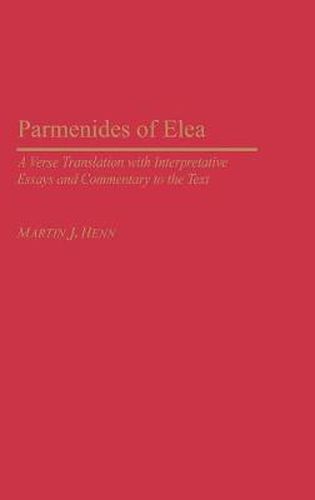Readings Newsletter
Become a Readings Member to make your shopping experience even easier.
Sign in or sign up for free!
You’re not far away from qualifying for FREE standard shipping within Australia
You’ve qualified for FREE standard shipping within Australia
The cart is loading…






Martin J. Henn’s Parmenides of Elea offers to the reader a reinvigorating verse translation of the Diels and Kranz B-Fragments of Parmenides cast in rhyming couplet iambic pentameter. Placing Parmenides in his proper historical context by taking seriously the impact of Persian Zoroastrianism on his developing monism, Henn supplies precise interpretation of the most difficult and vexing of Parmenides’s fragments, while also providing reliable philosophical analysis of the many seeming contradictions latent in the text.
The interpretive essays form a unique contribution to studies of this work, exploring such issues as the sprawling influences of Persian Zoroastrian dualism, literary parallels and contrasts with Hesiod’s Theogony, and the radical antithesis between a finite linear and an infinite closed-loop model of space and time. Overall, Henn’s work represents a new model for study of a key element of philosophical literature, making it a highly significant addition to the scholarship on the subject.
$9.00 standard shipping within Australia
FREE standard shipping within Australia for orders over $100.00
Express & International shipping calculated at checkout
Martin J. Henn’s Parmenides of Elea offers to the reader a reinvigorating verse translation of the Diels and Kranz B-Fragments of Parmenides cast in rhyming couplet iambic pentameter. Placing Parmenides in his proper historical context by taking seriously the impact of Persian Zoroastrianism on his developing monism, Henn supplies precise interpretation of the most difficult and vexing of Parmenides’s fragments, while also providing reliable philosophical analysis of the many seeming contradictions latent in the text.
The interpretive essays form a unique contribution to studies of this work, exploring such issues as the sprawling influences of Persian Zoroastrian dualism, literary parallels and contrasts with Hesiod’s Theogony, and the radical antithesis between a finite linear and an infinite closed-loop model of space and time. Overall, Henn’s work represents a new model for study of a key element of philosophical literature, making it a highly significant addition to the scholarship on the subject.